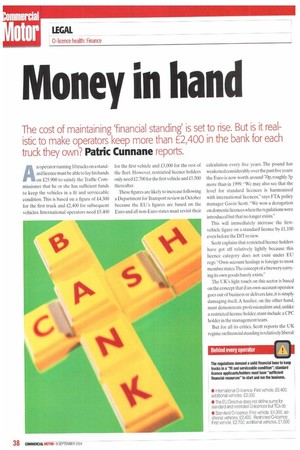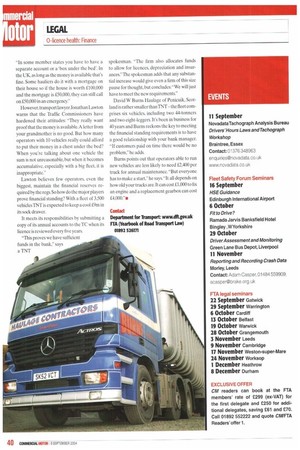Money in hand
Page 38

Page 40

If you've noticed an error in this article please click here to report it so we can fix it.
The cost of maintaining 'financial standing' is set to rise. But is it real istic to make operators keep more than £2,400 in the bank for each truck they own? Patric Cunnane reports.
An operator running 10 trucks on a standard licence must be able to lay his hands on £25,900 to satisfy the Traffic Commissioner that he or she has sufficient funds to keep the vehicles in a fit and serviceable condition. This is based on a figure of £4,300 for the first truck and £2400 for subsequent vehicles. International operators need £5,400 for the first vehicle and £3,000 for the rest of the fleet. However, restricted licence holders only need £2,700 for the first vehicle and £1,500 thereafter.
These figures are likely to increase following a Department for Transport review in October because the Ell's figures are based on the Euro and all non-Euro states must revisit their calculation every five years. The pound has weakened considerably over the past five years: the Euro is now worth around 70p, roughly 5p more than in 1999. "We may also see that the level for standard licences is harmonised with international licences," says FTA policy manager Gavin Scott. "We won a derogation on domestic licences when the regulations were introduced but that no longer exists."
This will immediately increase the firstvehicle figure on a standard licence by £1.100 even before the DfT review.
Scott explains that restricted licence holders have got off relatively lightly because this licence category does not exist under EU regs: "Own-account haulage is foreign to most member states.The concept of a brewery carrying its own goods barely exists."
The UK's light touch on this sector is based on the concept that if an own-account operator goes out of business or delivers late, it is simply damaging itself. A haulier, on the other hand, must demonstrate professionalism and, unlike a restricted licence holder, must include a CPC holder in the management team.
But for all its critics, Scott reports the UK regime on financial standing is relatively liberal: "In some member states you have to have a separate account or a 'box under the bed'. In the UK, as long as the money is available that's fine. Some hauliers do it with a mortgage on their house so if the house is worth £100,000 and the mortgage is £50.000, they can still call on £50,000 in an emergency" However, transport lawyer Jonathan Lawton warns that the Traffic Commissioners have hardened their attitudes: "They really want proof that the money is available.A letter from your grandmother is no good. But how many operators with 10 vehicles really could afford to put their money in a chest under the bed? When you're talking about one vehicle the sum is not unreasonable, but when it becomes accumulative, especially with a big fleet, it is inappropriate."
Lawton believes few operators, even the biggest, maintain the financial reserves required by the regs. So how do the major players prove financial standing? With a fleet of 3,500 vehicles TNT is expected to keep a cool £9m in its sock drawer.
It meets its responsibilities by submitting a copy of its annual accounts to the TC when its licence is reviewed every five years.
"This proves we have sufficient funds in the bank," says a TNT spokesman. "The firm also allocates funds to allow for licences, depreciation and insurances.The spokesman adds that any substantial increase would give even a firm of this size pause for thought, but concludes: "We will just have to meet the new requirements."
David W Burns Haulage of Penicuik, Scotland is rather smaller than TNT the fleet comprises six vehicles, including two 44-tonners and two eight-leggers. It's been in business for 40 years and Burns reckons the key to meeting the financial standing requirements is to have a good relationship with your bank manager. -If customers paid on time there would be no problem," he adds.
Burns points out that operators able to run new vehicles are less likely to need £2,400 per truck for annual maintenance. "But everyone has to make a start," he says. -It all depends on how old your trucks are. It can cost £1,000 to fix an engine and a replacement gearbox can cost £4,000."N
Contad Department for Transport: www.dft.gov.uk FTA (Yearbook of Road Transport Law) 01892 526111




























































































































































































